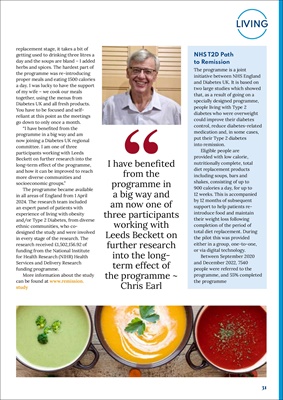
31
LIVING
replacement stage, it takes a bit of
getting used to drinking three litres a
day and the soups are bland - I added
herbs and spices. The hardest part of
the programme was re-introducing
proper meals and eating 1500 calories
a day. I was lucky to have the support
of my wife - we cook our meals
together, using the menus from
Diabetes UK and all fresh products.
You have to be focused and selfreliant
at this point as the meetings
go down to only once a month.
"I have benefited from the
programme in a big way and am
now joining a Diabetes UK regional
committee. I am one of three
participants working with Leeds
Beckett on further research into the
long-term effect of the programme,
and how it can be improved to reach
more diverse communities and
socioeconomic groups."
The programme became available
in all areas of England from 1 April
2024. The research team included
an expert panel of patients with
experience of living with obesity
and/or Type 2 Diabetes, from diverse
ethnic communities, who codesigned
the study and were involved
in every stage of the research. The
research received £1,502,156.92 of
funding from the National Institute
for Health Research (NIHR) Health
Services and Delivery Research
funding programme.
More information about the study
can be found at www.remission.
study
NHS T2D Path
to Remission
The programme is a joint
initiative between NHS England
and Diabetes UK. It is based on
two large studies which showed
that, as a result of going on a
specially designed programme,
people living with Type 2
diabetes who were overweight
could improve their diabetes
control, reduce diabetes-related
medication and, in some cases,
put their Type 2 diabetes
into remission.
Eligible people are
provided with low calorie,
nutritionally complete, total
diet replacement products
including soups, bars and
shakes, consisting of up to
900 calories a day, for up to
12 weeks. This is accompanied
by 12 months of subsequent
support to help patients reintroduce
food and maintain
their weight loss following
completion of the period of
total diet replacement. During
the pilot this was provided
either in a group, one-to-one,
or via digital technology.
Between September 2020
and December 2022, 7540
people were referred to the
programme, and 55% completed
the programme
I have benefited
from the
programme in
a big way and
am now one of
three participants
working with
Leeds Beckett on
further research
into the longterm effect
of
the programme ~
Chris Earl